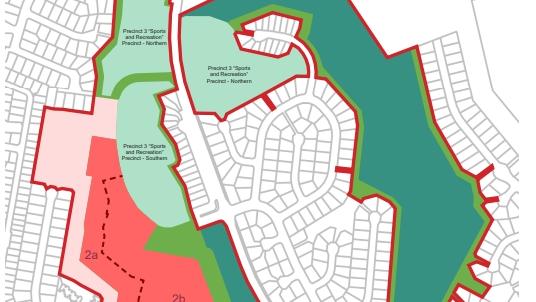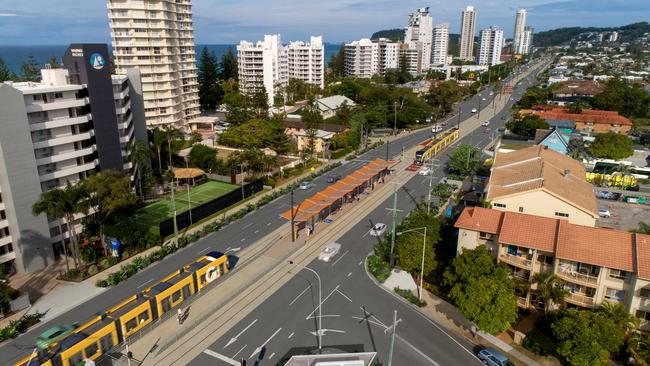Stand-off between council and State Government preventing 32,000 ‘tram’ homes being built
The $1.2bn Broadbeach-Burleigh light rail extension can handle 32,000 new dwellings, city estimates show. See what council’s planning boss urges the Housing Minister to do

Gold Coast
Don't miss out on the headlines from Gold Coast. Followed categories will be added to My News.
The Gold Coast planning boss councillor Mark Hammel is pleading with Housing Minister Meaghan Scanlon to apply her intervention that allowed 650 homes to be built on a country club to a much bigger housing crisis fix.
Cr Hammel wants her to focus on helping fast-track builds along the light rail corridor under construction to Burleigh with estimates the $1.2 billion Stage 3 track extension south from Broadbeach can handle 32,000 new dwellings.
City planners estimate 30,000-32,000 new units can be built in medium and high density zones in the entire corridor around the 6.7km track.
Studies which look at new “neighbourhood frameworks” show 15,000 dwellings can be constructed in Miami and at Nobbys Beach. They say the estimates are “conservative”.
Such sites and targeted growth areas at Labrador are estimated to go a long way to helping solve the Gold Coast’s housing crisis.
“Why would she not have directed these resources towards looking at the light rail Stage 3 corridor. Or to have looked at the former targeted growth area (at Labrador and Southport),” he said.

But the Government says it has yet to get such a request on tram sites from the City.
Ms Scanlon controversially deployed rarely-used powers to intervene in the Arundel Country club redevelopment proposal, which council had strongly rejected. Eventually she opted for a TLPI to allow 650 homes to be developed - a proposal which council and residents in the neighbourhood have strongly opposed.
Mr Hammel and Robina-based councillor Dan Doran were again strongly opposed.
Asked by the Bulletin about the City seeking a TLPI for the tram route, Ms Scanlon revealed there had been no official approaches.

“Council can put forward a TLPI any time it likes for government to consider – but we haven’t received any proposal from them,” Ms Scanlon said.
“We created the State Facilitated Development Pathway (SFD) because industry wanted to build affordable homes faster, and Queenslanders – especially young people and frontline workers - want more affordable homes.
“The Arundel golf course was disused and closed off to public access, and the TLPI actually makes sure more than 66 per cent of the land is sport, recreation, open space or conservation area while also delivering much-needed homes.
“There’s funding available and plenty of ways we can work with council to update their planning scheme, and I’m happy to work with them if they want to unlock more affordable, well-located homes.”
Meanwhile, the council had decided to stop work, after seven years of community consultation and planning, on City Plan amendments and work on a new scheme after being frustrated by delays in approval from State bureaucrats.
Mr Hammel said a TLPI could help meet targets immediately on dwelling supply.

“I can appreciate the Minister says we should put forward a proposal, but I think the Minister should recognise the City would like some level of assurance or level of direction from the State on an avenue forward that we are not going to see more time and effort wasted,” he said.
“If the Minister wants to give that undertaking that a TLPI is the preferred method to unlock immediate dwelling supply in those areas, we can get on with that work straight away.”
To meet current demands and future population growth, a housing supply of 433,100 dwellings by 2046 for the Gold Coast has been set up by the ShapingSEQ2023 plan.
Ensuring housing is as affordable as possible and meets the demand, the Coast will need deliver more than 6000 dwellings per year.

In 2023, council only approved 4,773 residential dwellings,already down 16 per cent from 2022.
Q Shelter, the peak body working to improve housing outcomes, has welcomed State Facilitated Development being used at Robina.
Q Shelter CEO Fiona Caniglia said State Facilitated Development reflected recommendations from her group to speed up delivery of homes.
“In a crisis like this, we need to remove every barrier to the delivery of homes,” she said.
“We urge community leaders and their constituences to support housing growth to meet the needs of a growing population.”
More Coverage
Originally published as Stand-off between council and State Government preventing 32,000 ‘tram’ homes being built





